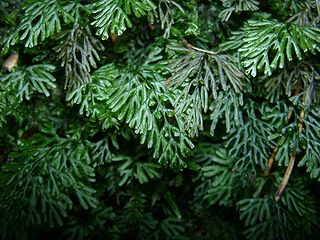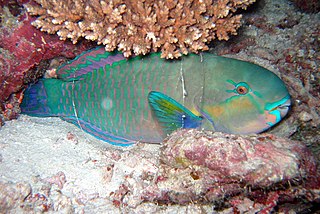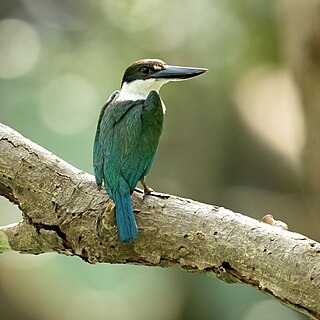
Geraniales is a small order of flowering plants, included within the rosid subclade of eudicots. The largest family in the order is Geraniaceae with over 800 species. In addition, the order includes the smaller Francoaceae with about 40 species. Most Geraniales are herbaceous, but there are also shrubs and small trees.

The Cyperaceae are a family of graminoid (grass-like), monocotyledonous flowering plants known as sedges. The family is large, with some 5,500 known species described in about 90 genera, the largest being the "true sedges" genus Carex with over 2,000 species.

Laburnum, sometimes called golden chain or golden rain, is a genus of two species of small trees in the subfamily Faboideae of the pea family Fabaceae. The species are Laburnum anagyroides—common laburnum and Laburnum alpinum—alpine laburnum. They are native to the mountains of southern Europe from France to the Balkans.

Cyperus is a large genus of about 700 species of sedges, distributed throughout all continents in both tropical and temperate regions.

The Hymenophyllaceae, the filmy ferns and bristle ferns, are a family of two to nine genera and about 650 known species of ferns, with a subcosmopolitan distribution, but generally restricted to very damp places or to locations where they are wetted by spray from waterfalls or springs. A recent fossil find shows that ferns of Hymenophyllaceae have existed since at least the Upper Triassic.
The dusky field rat, also known as the canefield rat, is a species of rodent in the family Muridae. It is found in Australia, Indonesia, and Papua New Guinea. In Australia it is found in northern Queensland and along the east coast as far south as Shoalwater Bay, where it is plentiful, and on South West Island in the Sir Edward Pellew Group off the Northern Territory, where it is considered a threatened species.
The Mindanao miniature babbler is a bird species in the family Cisticolidae. It was formerly included in M. leytensis as a subspecies, is now usually held to be a distinct species, M. sordidus.

Chlorurus sordidus, known commonly as the daisy parrotfish or bullethead parrotfish, is a species of marine fish in the family Scaridae.

Aplestosuchus is an extinct genus of baurusuchid mesoeucrocodylian known from the Late Cretaceous Adamantina Formation of São Paulo, southern Brazil. It contains a single species, Aplestosuchus sordidus. A. sordidus is represented by a single articulated and nearly complete skeleton, preserving the remains of an unidentified sphagesaurid crocodyliform in its abdominal cavity. The specimen represents direct evidence of predation between different taxa of crocodyliforms in the fossil record.

The Torresian kingfisher is a species of bird in the family Alcedinidae. It is found in southern New Guinea and in Australia. Its natural habitats are subtropical or tropical moist lowland forests, mangroves, and plantations. It was formerly considered a subspecies of the collared kingfisher.

Cyperus tenellus is a sedge of the family Cyperaceae commonly known as the tiny flatsedge.
The Pteridophyte Phylogeny Group (PPG) is an informal international group of systematic botanists who collaborate to establish a consensus on the classification of pteridophytes that reflects knowledge about plant relationships discovered through phylogenetic studies. In 2016, the group published a classification for extant pteridophytes, termed "PPG I". The paper had 94 authors.
Cyperus albus is a species of sedge that is native to southern parts of Africa.
Cyperus canus is a species of sedge that is native to parts of Mexico, Central America and northern South America.
Cyperus chalaranthus is a species of sedge that is native to parts of northern South America.
Cyperus rigens is a species of sedge that is native to parts of South America.
Cyperus tenerrimus is a species of sedge that is native to southern parts of North America, Central America and northern parts of South America.








